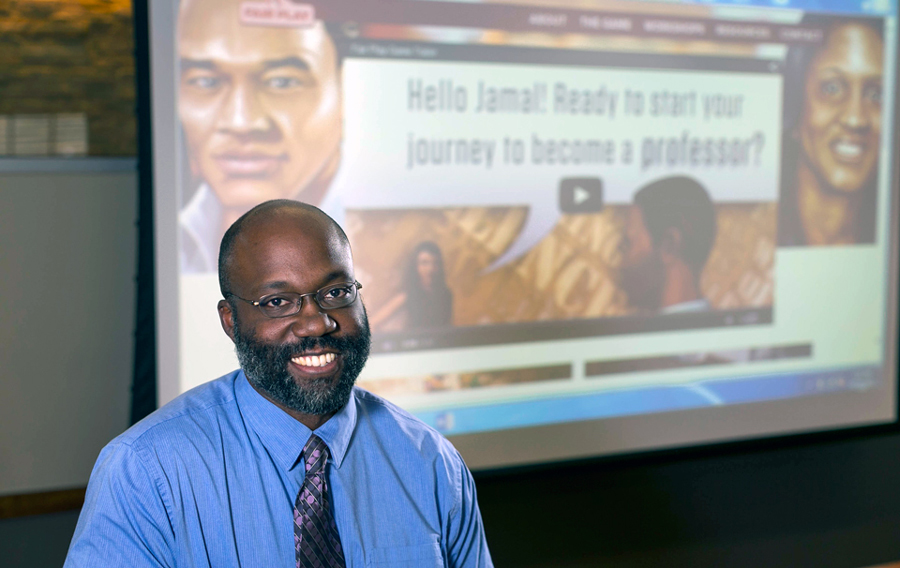STEMMing the Tide of Bias: Video Game Teaches Professors How Discrimination Feels
December 3, 2015 | By Lynn Armitage

Brett Woods
Brett Woods knows all too well what racial bias feels like. “When I was in graduate school, it was made clear to me that the only reason I was there was because I was fulfilling an affirmative-action requirement,” recalls Woods, who is African American. “And on more than one occasion, I was assumed not to be a person of knowledge or authority in situations where I actually was.”
Those unfortunate experiences are why Woods, now an associate professor in biology at the University of Wisconsin–Whitewater, feels a kindred spirit with Jamal Davis, a fictional African-American graduate student who experiences racial bias on the road to a doctoral degree in the video game “Fair Play.”
“It’s like watching a video of my own life,” Woods say. “Only I don’t require a video game to know that this really happens.”
“Fair Play” is the brainchild of Molly Carnes, a professor in UW–Madison’s School of Medicine and Public Health, who worked with the Games+Learning+Society Center to create the game with funding from the National Institutes of Health (NIH).
With a new $1.6 million, five-year NIH grant, Christine Pribbenow, director of the LEAD Center in the UW–Madison School of Education’s Wisconsin Center for Education Research, is using the video game to teach university professors to feel empathy for their students and to adopt their perspective.
This really resonates with Woods, who says much of the bias he encountered in graduate school came from non-minority professors in positions of power. “The real issue is subtlety,” Woods says. “What is so dangerous about biases is that many people are not aware that they even have them.”
Pribbenow and the “Fair Play” staff will conduct up to 20 workshops for university educators at UW-Madison and across the country over five years using Carnes’ video game. “We are hoping that empathy and perspective-taking does make a difference in the way that teachers interact with students,” Pribbenow says, adding that everyone is biased in some way and that this prejudice carries over subconsciously into the classroom. “Teachers have the best intentions to treat people equally based on their merit, but we don’t always do it.”
Pribbenow is especially concerned about the connection between bias and an alarming lack of minorities in the fields of science, technology, engineering, mathematics and medicine (STEMM).
According to the 2015 U.S. News/Raytheon STEM Index, while there have been slight increases in job opportunities, degrees earned and general student interest in the fields of science, technology, engineering and mathematics in the last year, gender and racial gaps have widened. The National Science Board concurs, reporting that a 14-year trend of underrepresentation among women and minorities continues in these professions.
“We focused the video game on a black male student because black men make up less than three percent of STEMM faculty in this country,” Pribbenow explains. “This should be proportionate to the population.”
Much effort and millions of dollars have been invested through the years to improve upon that percentage, with no significant results. “Something else is going on here,” says Pribbenow.
The “Fair Play” video game raises the possibility that microaggressions, stereotyping and unintentional bias — similar to what Woods experienced more than 14 years ago as a graduate student — may play a part in discouraging underrepresented minorities from entering and staying in STEMM fields.
Woods warns of a disturbing outcome when university professors don’t treat minority students equitably: “Minorities will quit labs, change majors or choose a degree in something else if they don’t feel comfortable in a classroom,” leading to a false perception that these minorities are not serious students or up to the academic challenge.
Even so, is it realistic to think that a simple video game can change the tide of racial bias? “Why not? I mean, an iPhone has changed the world,” says Woods, who, due to funding from the National Science Foundation’s WiscAMP award (# 1400815), recently attended one of Pribbenow’s “Train the Trainer” workshops. This training has prepared Woods to introduce “Fair Play” to other UW–Whitewater professors. “As long as people are willing to talk and work toward making things better, there is always hope.”


